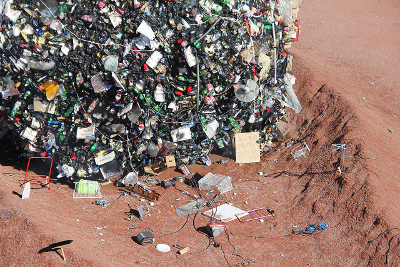
“Littering Meteor” by Mickaël Fonjallaz; Source: Flickr/ CC BY
Household waste is waste which is generated in the day to day operations of a household. It can include everything from unfinished food to worn out toothbrushes.
UK’s citizens throw away 11.9 million tons of household waste annually, or 0.45 tons per household per year. From these 11.9 million tons, Londoners are responsible for 1.6 million tons.
One of most important issues is the amount of waste.
People can radically reduce the amount of it if they just think for a while before toss something in the garbage. There are many recycling programs which accept paper, cans, bottles, glass and other items which can be reused.
♻ Assess the exact amount of waste your household produces
Examining it will help you find areas where you can make changes in your disposal ways and reduce the junk you would originally throw away. According to Precision Funding, you must have a starting basis for comparison in order to know how changes you’ve made affect the amount of household waste you produce. Also, check what material is recyclable and what isn’t in your area.
♻ From the table to the soil
Food scraps accumulates a large portion of all the household waste. One way to fight the food waste problem is composting. It is the natural process of decomposition that turns organic materials like garden waste and vegetable food scraps into a crumbly, dark and earthy smelling material called compost. The compost is quite rich in nutrients and when used in your garden, it slowly releases nutrients that plants can absorb.
♻ Re-purpose things that you usually throw away
People often throw away things that have outlived their original purpose. But surely, they can be used in different ways. You can use old t-shirts and towels as rags for domestic cleaning. Old toothbrush is ideal to clean grout and other small places. Try filling paper egg cartons with potting soil and use them to plant seedlings. Save the lawn clippings to use them as mulch.
♻ Bring less waste into your home
Try to pick products with less packaging while you shop. Choose one large sized package over individually packed portions of an item. Buying in bulk is another way to reduce your waste. Big stores have a bulk section which allows you buy the amount of the item you want and to store it in your own container. Choose frozen foods in plastic bags over those in cardboard boxes as most of the cardboard packaging is not recyclable.
♻ Purchase quality items
We know this sometimes can be hard, but look for items that can withstand the everyday use. For example, toys made from wood are less likely to break than plastic toys. Buying a high quality cooking pan will save you money when having to replace it quickly due to a warped bottom.
♻ Try to maintain your possessions
If you can keep items in good condition or you are good at repairing them, you can avoid throwing them to garbage. For instance, try fixing the holes or the tears in your clothing or to have your shoes resoled. Cleaning and performing a regular maintenance on your appliances will save you money and will definitely reduce the waste.
We gave you the advice, now it is up to you to make them a part of your day-to-day routine. Turning them into habits is the best way to succeed in reducing your household waste. Remember, things considered as “waste” may be useful to others.
Tags: household waste, recycling
